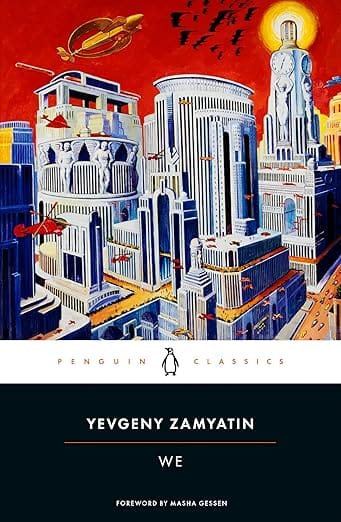Freedom Behind Glass or "We" by Yevgeny Zamyatin
Explore Yevgeny Zamyatin's haunting classic "We," a foundational dystopian novel examining faith, freedom, and the dangers of total state control. Perfect for those who love timeless sci-fi.

It is remarkable how a book written more than a century ago can still make us think hard about personal freedom.
"We" by Yevgeny Zamyatin was first published in 1921. Though it faced censorship and controversy in the Soviet Union, it found its way to the West and helped shape the path of dystopian science fiction for generations.
Readers familiar with George Orwell's "1984" and Aldous Huxley's "Brave New World" will see clear connections to Zamyatin's earlier masterpiece and, perhaps, reflect on the novel's enduring warnings against total government control and appreciate how it remains relevant.

"We" by Yevgeny Zamyatin
Yevgeny Zamyatin's We is a powerfully inventive vision that has influenced writers from George Orwell to Ayn Rand. In a glass-enclosed city of absolute straight lines, ruled over by the all-powerful 'Benefactor', the citizens of the totalitarian society of OneState live out lives devoid of passion and creativity - until D-503, a mathematician who dreams in numbers, makes a discovery: he has an individual soul.
Set in the twenty-sixth century AD, We is the classic dystopian novel and was the forerunner of works such as George Orwell's 1984 and Aldous Huxley's Brave New World. It was suppressed for many years in Russia and remains a resounding cry for individual freedom, yet is also a powerful, exciting and vivid work of science fiction. Clarence Brown's brilliant translation is based on the corrected text of the novel, first published in Russia in 1988 after more than sixty years' suppression.
Cities of Glass
"We" is set in a futuristic society called the One State. Every citizen —known only by a letter-and-number combination— lives in a rigidly organized glass city.
The Table of Hours, a strict daily schedule, controls everything from sleep to work. Citizens wear identical clothing and have no privacy from the watchful eye of the Benefactor, the regime's all-powerful leader.
At the heart of the story is D-503, a mathematician and chief engineer of a spacecraft named the Integral. While preparing the Integral to carry the One State's ideology to other worlds, D-503 meets I-330. Her nonconformist behavior and mysterious allure awaken doubts within him about the society he once admired.
Zamyatin's imagined world is both intriguing and chilling, depicting a future stripped of freedom in the name of collective "happiness."
Themes and Ideas
One of the most striking themes in "We" is the battle between individuality and the demands of a tightly governed collective.
The novel shines a light on the dangers of a system that rejects personal conscience and family bonds. Its focus on the suppression of love and genuine relationships underscores the importance of familial and spiritual connections.
Zamyatin's warnings echo in our world today. Though the book addresses state power, it can also remind us that any authority —government, technological, or ideological— that attempts to replace faith or erode personal freedom deserves close scrutiny.
"We" affirms the sacredness of the individual soul, cautioning us not to let any earthly power overshadow God's intended design for man.
No Privacy
Zamyatin's originality lies in his vision of a transparent city made of glass, where privacy is a thing of the past. The numbered citizens, constant surveillance, and publicly organized "private" time all paint a world where the state reigns supreme.
These ideas shaped later dystopias, laying the foundation for everything from Orwell's pervasive Big Brother to modern stories about high-tech authoritarianism.
The plausibility of Zamyatin's future society is rooted in its cold logic. The Table of Hours turns human life into a product of scientific management, resembling real-world trends in early industrial Taylorism. By pushing these trends to their extreme, Zamyatin crafts a setting that feels both alien and uncomfortably real.

D-503 Grows
D-503 begins as a loyal servant of the One State, representing the everyman in a futuristic tyranny. He slowly comes to question the system when he encounters I-330, whose rebellious nature challenges him to rethink everything he knows. This character arc follows a familiar science fiction pattern of an obedient citizen turned reluctant rebel.
Meanwhile, O-90, assigned to D-503 under the state's controlled relationship system, struggles with her longing for motherhood and genuine affection. Her conflict highlights a traditional desire for family that resonates with our deeply held convictions about the value of life and lineage.
Although the characters may feel somewhat symbolic, they serve the story's message well. Each figure embodies a facet of human personality under pressure.
D-503's journey from a trusting believer in the One State to a man torn between duty and desire gives readers a clear sense of his moral and spiritual awakening.
Thoughts for "We"
"We" remains as haunting and thought-provoking now as it was when Zamyatin wrote it.
Its lessons about the cost of surrendering our freedoms to an all-controlling authority ring powerfully in today's political and technological climate.
The book's historical context, rooted in early Soviet oppression, can help modern readers appreciate just how radical its message was in its time.
Yet, even without that background, the novel's spiritual and moral underpinnings continue to resonate.
Though "We" requires some understanding of its place in 20th-century history, Zamyatin's warning against unchecked power speaks directly to our era. "We" is an essential reminder that our conscience should not be sacrificed on the altar of state efficiency. It set the standard for later dystopian works and continues to stand as a strong advocate for the dignity of the individual before any earthly throne.
Further Reading
1. www.supersummary.com, accessed December 26, 2024, https://www.supersummary.com/we/summary/#:~:text=We%20is%20a%201921%20science,One%20State's%20mathematically%20perfect%20happiness.
2. We Study Guide | Literature Guide | LitCharts, accessed December 26, 2024, https://www.litcharts.com/lit/we
3. We Summary | SuperSummary, accessed December 26, 2024, https://www.supersummary.com/we/summary/
4. Summary of 'We' by Yevgeny Zamyatin: A Detailed Synopsis, accessed December 26, 2024, https://newbookrecommendation.com/summary-of-we-by-yevgeny-zamyatin-a-detailed-synopsis/
5. We by Yevgeny Zamyatin Plot Summary - LitCharts, accessed December 26, 2024, https://www.litcharts.com/lit/we/summary
6. We (novel) - Wikipedia, accessed December 26, 2024, https://en.wikipedia.org/wiki/We_(novel)
7. The end of We, the start of dystopian fiction | Going Box By Box, accessed December 26, 2024, https://goboxbox.wordpress.com/2014/10/26/we-8/
8. www.litcharts.com, accessed December 26, 2024, https://www.litcharts.com/lit/we/characters
9. We Characters - eNotes.com, accessed December 26, 2024, https://www.enotes.com/topics/we-yevgeny-zamyatin/characters
10. D-503 Character Analysis in We - LitCharts, accessed December 26, 2024, https://www.litcharts.com/lit/we/characters/d-503
11. We Character List - GradeSaver, accessed December 26, 2024, https://www.gradesaver.com/we/study-guide/character-list
12. How were these expressed in the original Russian of Yevgeny Zamyatin's "We"?, accessed December 26, 2024, https://russian.stackexchange.com/questions/15604/how-were-these-expressed-in-the-original-russian-of-yevgeny-zamyatins-we
13. Exploring 'We' by Yevgeny Zamyatin: A Literary Deep Dive - BiblioLifestyle, accessed December 26, 2024, https://bibliolifestyle.com/we-yevgeny-zamyatin/
14. A Study On Narrative Techniques In We By Yevgeny Zamyatin, accessed December 26, 2024, https://www.jlls.org/index.php/jlls/article/viewFile/5546/1971
15. www.litcharts.com, accessed December 26, 2024, https://www.litcharts.com/lit/we/themes
16. WE by Yevgeny Zamyatin: A Literary Analysis | by Joanna Straughn | Medium, accessed December 26, 2024, https://medium.com/@Joanna_Straughn/we-by-yevgeny-zamyatin-a-literary-analysis-eef0c79b4eea
17. I-330: Counterpart of Christ in Zamyatin's We | Writing Program - Boston University, accessed December 26, 2024, https://www.bu.edu/writingprogram/journal/past-issues/issue-1/fogley/
18. Life beyond the Green Wall: Limiting the Limitless iin Zamyatin's WE, accessed December 26, 2024, https://cmlt.franklin.uga.edu/news/stories/2014/life-beyond-green-wall-limiting-limitless-iin-zamyatins-we
19. We (Yevgeny Zamyatin) - The Worthy House • Towards A Politics of Future Past, accessed December 26, 2024, https://theworthyhouse.com/2021/04/23/we-yevgeny-zamyatin/
20. We by Yevgeny Zamyatin | Nadya Inklore, accessed December 26, 2024, https://inklore.co.uk/index.php/2023/10/05/we-by-yevgeny-zamyatin/
21. “A foundational text in the dystopian canon” – WE by Yevgeny Zamyatin - Bookmunch, accessed December 26, 2024, https://bookmunch.wordpress.com/2021/10/16/a-foundational-text-in-the-dystopian-canon-we-by-yevgeny-zamyatin/
22. We by Yevgeny Zamyatin - A Review for #VintageSciFiMonth - SciFi Mind, accessed December 26, 2024, https://www.scifimind.com/we-by-yevgeny-zamyatin-a-review-for-vintagescifimonth/
23. newcriterion.com, accessed December 26, 2024, https://newcriterion.com/article/one-hundred-years-of-we/#:~:text=Yevgeny%20Zamyatin%20wrote,in%201988%2C%20at%20its%20dusk.
24. Freedom and Happiness (Review of 'We' by Yevgeny Zamyatin) | The Orwell Foundation, accessed December 26, 2024, https://www.orwellfoundation.com/the-orwell-foundation/orwell/essays-and-other-works/freedom-and-happiness-review-of-we-by-yevgeny-zamyatin/
25. One hundred years of “We” | The New Criterion, accessed December 26, 2024, https://newcriterion.com/article/one-hundred-years-of-we/
26. "We" by Eugnen Zamiatin - Scholarly Commons, accessed December 26, 2024, https://commons.erau.edu/oer-main/56/
27. Book Review: A Plea for Nature and 'Us'—The Novel “We” by Yevgeny Zamyatin, accessed December 26, 2024, https://ninamunteanu.me/2023/07/02/book-review-when-we-is-not-us-we-by-yevgeny-zamyatin/
28. (PDF) Zamyatin's We and the Idea of the Dystopie - ResearchGate, accessed December 26, 2024, https://www.researchgate.net/publication/273290061_Zamyatin's_We_and_the_Idea_of_the_Dystopie
29. Dystopia as Protest: Zamyatin's We and Orwell's Nineteen Eighty - Four - Salem Press, accessed December 26, 2024, https://salempress.com/Media/SalemPress/samples/protest_pgs.pdf

